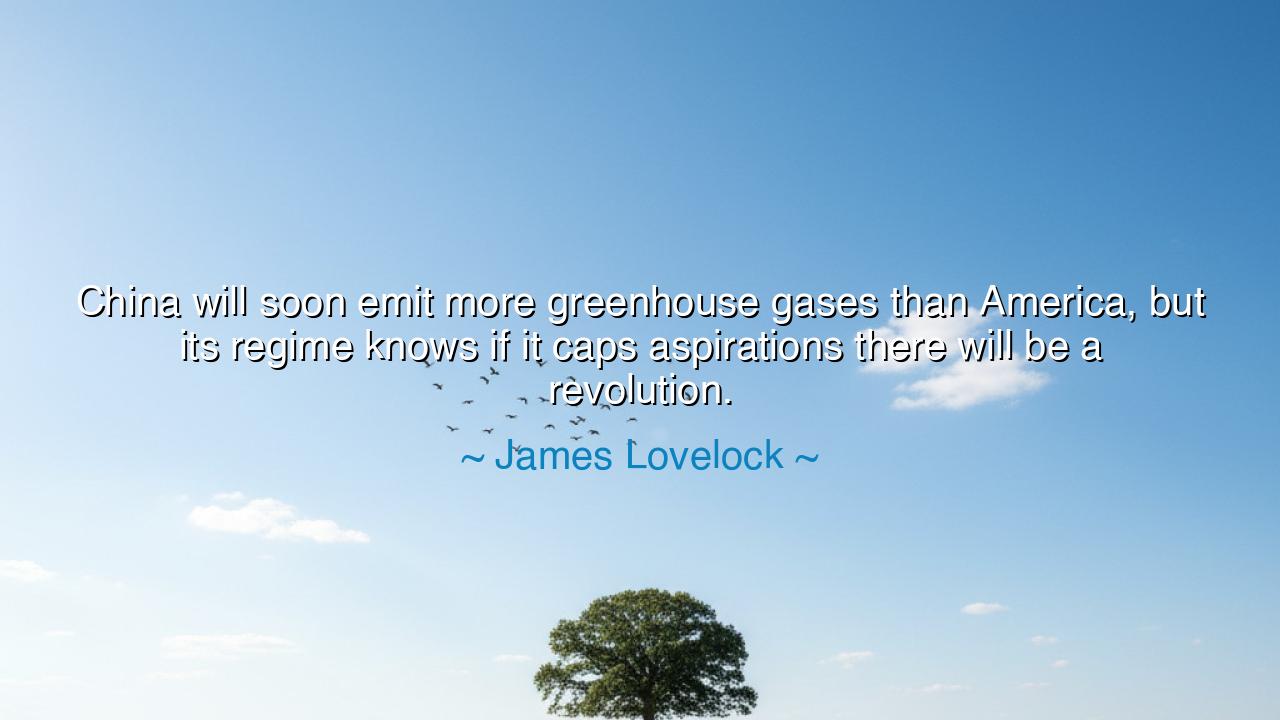
China will soon emit more greenhouse gases than America, but its
China will soon emit more greenhouse gases than America, but its regime knows if it caps aspirations there will be a revolution.






When James Lovelock declared, “China will soon emit more greenhouse gases than America, but its regime knows if it caps aspirations there will be a revolution,” he was not merely speaking of politics or pollution—he was unveiling a truth at the heart of civilization’s struggle between prosperity and preservation. His words are both warning and lament. For Lovelock, the scientist who saw the Earth as a living organism—the Gaia Hypothesis—understood that the fever of human progress burns hotter with every generation. He saw that nations, like men, are torn between the hunger to rise and the wisdom to restrain. In China’s rise, he perceived a mirror of all humanity: the desire to build, to consume, to ascend—and the danger that such ascent, if ungoverned, may bring the world to ruin.
The essence of Lovelock’s warning lies in balance. China, like many nations before it, stands upon the knife’s edge of destiny. On one side lies the dream of wealth and modern power—the factories, the towers, the bright lights of progress. On the other lies the shadow of environmental collapse, a planet suffocating under the smoke of its own ambitions. Yet Lovelock saw deeper: he understood that no ruler can crush the hopes of a billion souls. To cap “aspirations,” to deny the people their climb toward comfort after centuries of hardship, would invite revolt. Thus, the tragedy of his insight—humanity’s pursuit of progress, though noble, may yet destroy the very world that sustains it.
The story of this truth is as old as civilization itself. Consider the fall of Easter Island, where the ancient Rapa Nui people carved their colossal statues, each one a symbol of pride and power. To move them, they cut down forests, stripping their island bare. When the last tree fell, the soil eroded, the crops failed, and the people turned upon one another. Their aspirations, untempered by foresight, became their undoing. Lovelock’s words echo through their tragedy: when desire blinds wisdom, when ambition devours restraint, revolution follows not from tyranny alone, but from the collapse of the world itself.
China’s story, though vastly greater in scale, reflects this ancient pattern. In its quest to lift millions from poverty, it has fueled its engines with coal, steel, and sweat. The result is breathtaking—a civilization reborn—but the price is the choking of its skies, the poisoning of its rivers, and the warming of the Earth. Lovelock does not condemn this ambition; he recognizes it as part of the grand human struggle—to build and destroy, to learn and suffer. Yet his tone carries sorrow, for he knows that the world’s fate is bound together. When one great power rises in smoke, the whole Earth breathes that smoke. In Gaia’s eyes, there are no borders.
But his warning is not despair—it is a call for wisdom among leaders and awareness among peoples. The wise ruler must learn what the ancients knew: that prosperity bought at the price of the Earth’s health is fleeting. A nation that burns its future for present glory builds a pyre, not a throne. Yet, Lovelock also acknowledges the peril of forcing sacrifice upon a hungry populace. To demand restraint from the poor while the rich still feast is not justice—it is cruelty. Thus, the true challenge of our time is moral: to redefine growth, to make innovation serve life rather than consume it.
History offers glimpses of this possibility. In the 20th century, the world faced the threat of nuclear annihilation—yet through diplomacy, courage, and the wisdom of cooperation, the fire was contained. The same spirit must now awaken for the climate. Nations must compete in ingenuity, not destruction; leaders must inspire their people not with false comfort, but with purpose—that humanity’s destiny is not to conquer the Earth, but to live in harmony with it. This is the revolution that Lovelock calls for, not of violence, but of vision.
Let the lesson of Lovelock’s words be carried as a torch for future generations: prosperity without wisdom is peril, and restraint without compassion is tyranny. Humanity must learn to weave its dreams with humility—to see that the Earth, like a mother, gives much, but not without limit. The fires of industry and the hunger for progress must be guided by conscience, not greed. For if the leaders of nations do not find the courage to balance aspiration and preservation, then the revolution Lovelock foresaw will not be of politics, but of nature itself—and in that uprising, mankind will find no victor, only reckoning.






AAdministratorAdministrator
Welcome, honored guests. Please leave a comment, we will respond soon